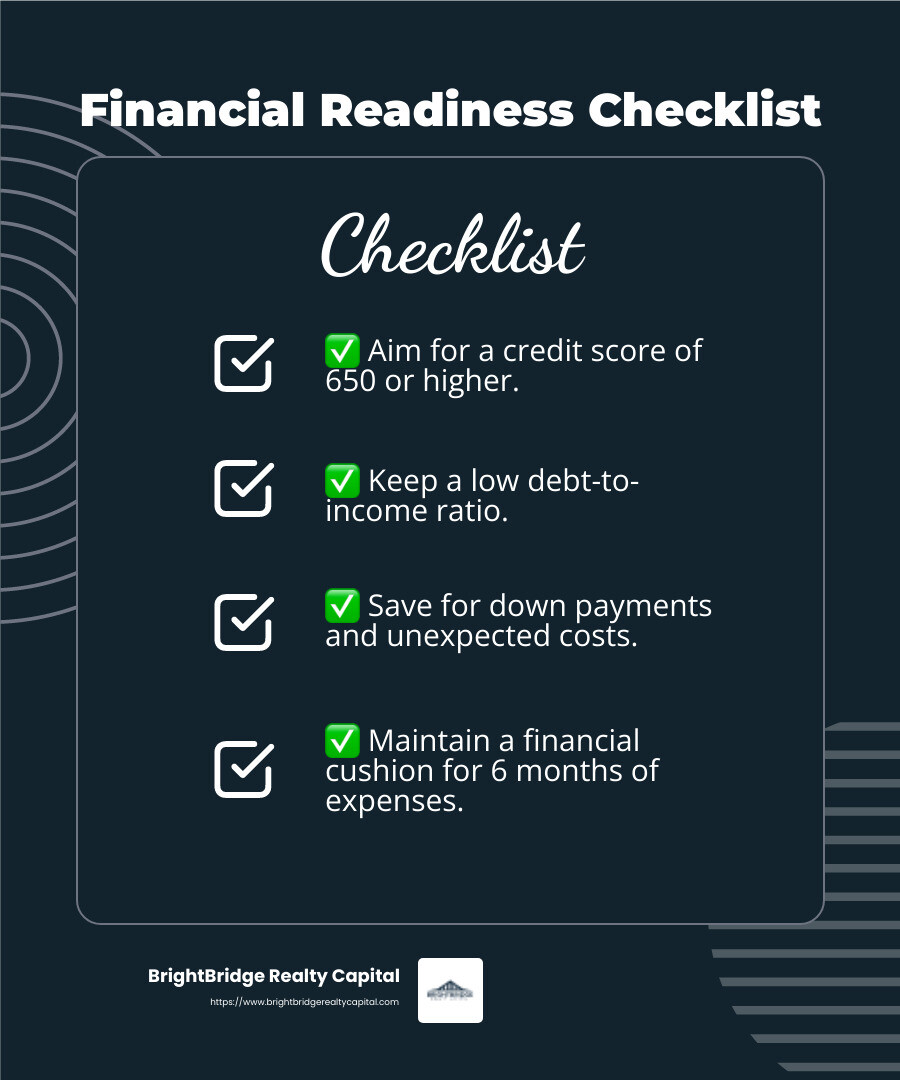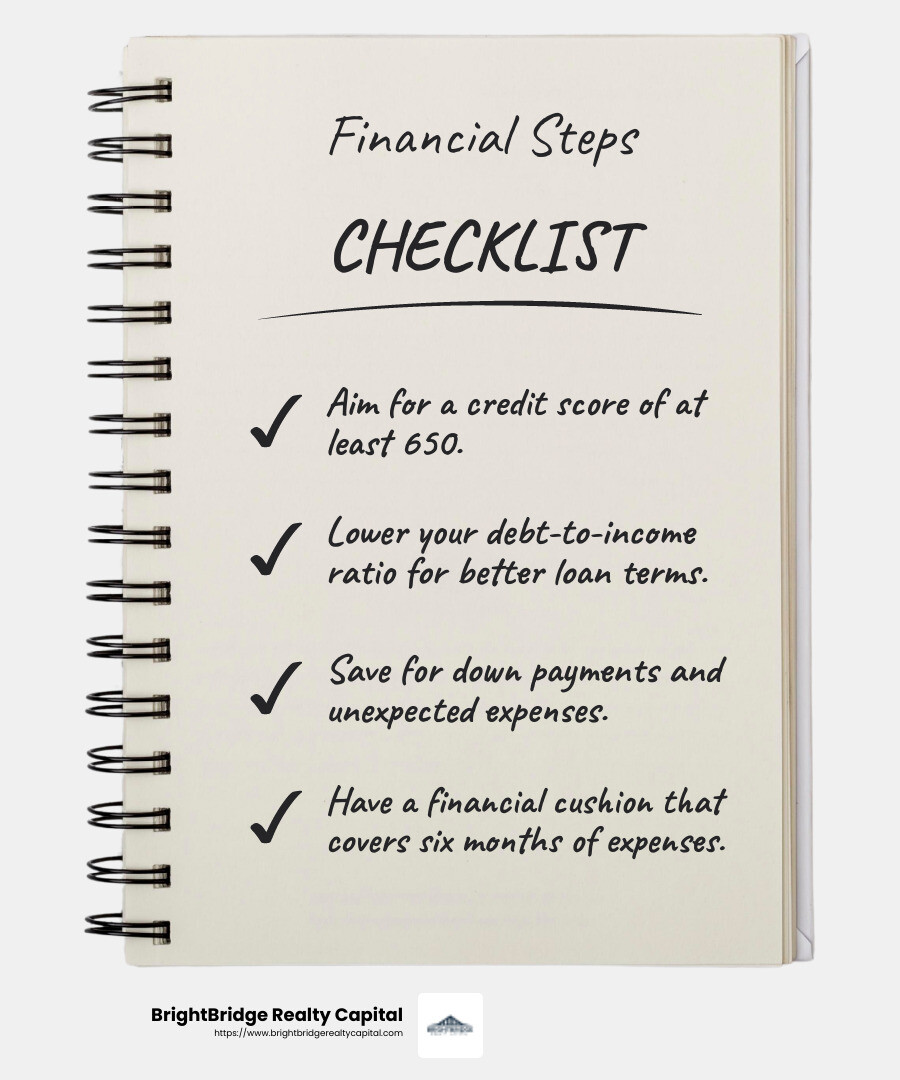Real Estate Investment 101: Must-Have Resources for Beginners

Real estate investment resources can empower beginners to take their first steps toward financial security. This field, valued at more than $230 trillion globally, offers a variety of opportunities through different property types such as residential, commercial, and land.
For those eager to dive into real estate, here's what you need to begin:
- Understand Property Types: Know the difference between residential and commercial properties and how zoning impacts your investments.
- Research Thoroughly: Use market analysis to determine high-demand locations and avoid common pitfalls.
- Educate Yourself: Leverage online platforms and connect with investment communities like BiggerPockets for guidance.
- Develop Skills: Focus on negotiation, financial analysis, and market knowledge to increase your success rate.
- Seek Guidance: Partner with experienced real estate agents and financial advisors to steer complex transactions confidently.
Investing in real estate is not just about buying properties; it's about strategic planning, informed decision-making, and continuous learning. The journey begins with equipping yourself with the right resources to make sound investments and achieve financial security.

Understanding Real Estate Investment
When it comes to real estate investment, understanding the basics is crucial. This involves knowing different property types, choosing suitable investment strategies, and assessing your risk tolerance.
Property Types
Real estate isn't one-size-fits-all. It comes in various forms, and each type has its own set of characteristics:
Residential Properties: These are properties zoned for living, like single-family homes, apartments, and condos. They are often the first choice for beginners due to their familiarity and relatively straightforward management.
Commercial Properties: Think office buildings, shopping malls, and warehouses. These properties can offer higher returns but require more expertise and capital.
Land: Investing in land can be lucrative, especially if you anticipate zoning changes or development in the area. However, it demands patience and a keen understanding of local regulations.
Understanding these property types is your first step in crafting a successful investment strategy.
Investment Strategies
Once you've grasped the property basics, it's time to explore strategies. Here are a few popular ones:
Buy and Hold: Purchase a property and keep it for the long term. This strategy is ideal for generating rental income and benefiting from property appreciation over time.
Flipping: Buy properties at a low price, renovate them, and sell for a profit. This requires a keen eye for undervalued properties and solid renovation skills.
Real Estate Investment Trusts (REITs): Invest in real estate without owning physical property. REITs are companies that own and manage real estate portfolios, offering dividends to investors. They're a good option for those seeking exposure to real estate with less hands-on involvement.
Risk Tolerance
Your risk tolerance will shape your investment decisions. Here’s how to think about it:
Low Risk: If you prefer stability, consider investing in residential properties or REITs. These options tend to have more predictable returns.
Moderate Risk: Commercial properties or land investments may offer higher returns but come with more variables and complexities.
High Risk: Flipping properties can yield quick profits but also involves significant risk and requires expertise in property valuation and renovation.
Assessing your risk tolerance helps you align your investment choices with your financial goals and comfort level.
Understanding these fundamentals sets the stage for informed decision-making in real estate. Next, we'll explore the top strategies for real estate investment to help you build a robust portfolio.
Real Estate Investment Resources
When diving into real estate investment, having the right resources is key. Let's break down the essentials: financial assessment, market research, and property selection.
Financial Assessment
Before you make any investment, a thorough financial assessment is crucial. This involves understanding your cash flow, operating expenses, and potential returns on investment.
Cash Flow: Calculate the money your property generates minus operating costs. Positive cash flow is the goal, ensuring your investment is profitable.
Operating Expenses: Consider costs like maintenance, property management, and HOA fees. These can impact your investment's profitability.
Mortgages and Financing: Know the types of home mortgages available. Fixed-rate, adjustable-rate, and interest-only mortgages each have their pros and cons. Choose the one that aligns with your financial situation and goals.
Market Research
Understanding the market is vital to making smart real estate investments. Here are some steps to guide you:
Local Regulations and Economic Conditions: Check local ordinances to ensure there are no regulations against flipping or renting. Economic conditions can also affect property values and rental demand.
Property Types and Trends: Use resources like Redfin to gather data on average home costs and median rent prices. This helps you understand market trends and demand for different property types.
Social Media and Networking: A strong social media presence can help you network with other investors and stay updated with market news. This is crucial for spotting opportunities and trends.
Property Selection
Choosing the right property is a critical step in real estate investment. Here's how to approach it:
Determine Your Buy Box: Decide on the type of property you want to invest in—condos, single-family homes, or commercial properties. Consider factors like location, number of bedrooms, and square footage.
Use Online Tools: Websites like Redfin can provide insights into property prices, HOA fees, and insurance options. This data helps you estimate expenses and potential rental income.
Inspection and Due Diligence: Always conduct a thorough inspection and due diligence before purchasing. This includes reviewing documents, assessing risks, and possibly renegotiating prices based on inspection findings.
By focusing on these real estate investment resources, you'll be better equipped to make informed decisions and build a successful investment portfolio. Next, we'll dig into the top strategies for real estate investment to further guide your journey.
Top Real Estate Investment Strategies
When it comes to real estate, there are several strategies you can use to grow your wealth. Let's explore the top three: buy and hold, flipping, and REITs.
Buy and Hold
The buy and hold strategy is a favorite among beginners and seasoned investors alike. It's simple: buy a property, rent it out, and hold it for the long term. Over time, the property may appreciate in value, allowing you to sell it for a profit.
Why choose buy and hold?
- Steady Income: Renting out your property provides a consistent cash flow. It's a great way to earn passive income each month.
- Appreciation: Real estate often increases in value over time. This means when you eventually sell, you could see a significant return on your investment.
- Tax Benefits: Owning rental properties can offer tax advantages, like deducting mortgage interest and property taxes.
For first-time investors, turn-key properties are ideal. These homes are ready to rent with little to no renovation needed, minimizing upfront costs and effort.
Flipping
Flipping is all about buying low, renovating, and selling high. This strategy requires a keen eye for undervalued properties and a knack for renovations.
Why flipping?
- Quick Profits: Unlike buy and hold, flipping can yield quick returns. Once renovations are complete, the property can be sold at a higher price.
- Creative Outlet: If you're handy or enjoy interior design, flipping offers a chance to transform a space and see the results of your efforts.
However, flipping isn't for everyone. It requires significant time and effort, and the risk is higher if the market shifts or renovation costs spiral. Always consider the after-repair value (ARV) and stick to the 70% rule: spend no more than 70% of the ARV on the purchase and renovation.
REITs
For those who prefer a more hands-off approach, Real Estate Investment Trusts (REITs) are an excellent option. These are companies that own or finance income-producing real estate, like office buildings or shopping centers.
Why invest in REITs?
- Liquidity: REITs trade on major stock exchanges, so you can buy and sell them like stocks. This makes them more liquid than physical properties.
- Diversification: Investing in a REIT can give you exposure to a broad range of real estate assets without needing to own any property directly.
- Dividends: REITs often pay high dividends, providing a regular income stream. This makes them a popular choice for retirement accounts.
For new investors, publicly traded REITs are a safer bet than non-traded ones, which can be harder to sell.
In summary, each strategy—buy and hold, flipping, and REITs—offers unique benefits and challenges. By understanding these options, you can choose the best path based on your financial goals and risk tolerance.
Next, we'll dive into the steps to start investing in real estate, ensuring you're well-prepared for your investment journey.
Steps to Start Investing in Real Estate
Starting your journey into real estate investment can seem daunting, but breaking it down into manageable steps makes it achievable. Let's explore the essential steps: financial readiness, market research, and property management.
Financial Readiness
Before diving into real estate, ensure your finances are in order. Here's how:
- Credit Score: Aim for a credit score of at least 650. This helps you secure better loan terms. Improve your score by making payments on time and reducing your credit utilization rate.
- Debt-to-Income Ratio: Lenders look at this to assess your ability to manage monthly payments. Lowering this ratio can improve your loan terms.
- Savings: Real estate requires upfront capital. Save for down payments, closing costs, and unexpected expenses. A good rule of thumb is to have a cushion that covers six months of expenses.

Market Research
Understanding the market is key to making informed investment decisions.
- Local Knowledge: Start by looking at properties in your area. This minimizes overhead and allows you to be available for emergencies.
- Growth Areas: If your local market isn't ideal, consider areas with expanding job opportunities or places you love to visit. These areas often have great potential for appreciation.
- Trends and Data: Stay informed about local real estate trends, employment rates, and school quality. These factors can significantly impact property values.

Property Management
Once you've purchased a property, effective management ensures it remains a profitable investment.
- Self-Management: Managing a property yourself can save money and provide valuable industry experience. You'll learn about tenant management, maintenance, and financial reporting.
- Professional Management: If you prefer a hands-off approach, hire a property manager. They handle day-to-day operations, tenant screening, and maintenance. This option is ideal if you own multiple properties or lack the time to manage them yourself.
Property management is crucial for maintaining cash flow and property value. Whether you choose to manage yourself or hire a professional, ensure you have a system in place for smooth operations.
With these steps—financial readiness, market research, and property management—you'll be well-prepared to start your real estate investment journey.
Next, we'll explore frequently asked questions about real estate investment resources, providing insights into investing with little money and the best resources for beginners.
Frequently Asked Questions about Real Estate Investment Resources
How to invest in real estate with no money?
Investing in real estate with little or no money might sound impossible, but there are several strategies to consider:
Partnering with Investors: Team up with someone who has the capital but lacks the time or expertise. You can handle the day-to-day management while they provide the funds.
Seller Financing: Sometimes, sellers are willing to finance the purchase themselves. This means you pay the seller directly over time, often with little or no money down.
Lease Options: Rent a property with the option to buy it later. This gives you time to save for a down payment while locking in a purchase price.
Wholesaling: Find properties below market value, get them under contract, and sell the contract to another investor for a fee. This requires no money down but a good understanding of the market.
These strategies require creativity and negotiation skills but can open doors to real estate investment without a large initial outlay.
What are the best real estate investment resources for beginners?
Starting in real estate can be overwhelming, but several resources can ease the journey:
REITs: Real Estate Investment Trusts are a great way to invest in real estate without owning physical property. They offer dividends and are traded like stocks, making them accessible and liquid.
Online Platforms: Websites like Fundrise and RealtyMogul allow you to invest in real estate projects online. They offer a range of options from commercial properties to residential developments.
Educational Resources: Books, podcasts, and online courses can provide foundational knowledge. Look for content that explains real estate terms and strategies in simple language.
These resources can help beginners understand the market and start investing with confidence.
How to invest in real estate for passive income?
For those seeking passive income, real estate offers several avenues:
Rental Properties: Buy a property and rent it out. This generates regular income through monthly rent. You can manage the property yourself or hire a property manager for a more hands-off approach.
REITs: As mentioned, REITs provide dividends, offering a steady stream of income without the hassle of property management.
Crowdfunding: Online platforms allow you to invest in real estate projects without owning property. You can earn returns through interest or equity stakes in the projects.
These options provide opportunities to earn passive income, allowing you to build wealth over time with minimal day-to-day involvement.
Next, we'll dive deeper into the top real estate investment strategies, including buy and hold, flipping, and REITs.
Conclusion
In real estate investment, having the right resources and strategies is key to success. At BrightBridge Realty Capital, we specialize in providing customized real estate financing solutions that cater to your unique investment needs.
Our approach focuses on quick and flexible funding. We understand that opportunities in real estate can arise suddenly and require fast action. That's why we pride ourselves on our ability to offer fast closings, often within a week. This speed ensures that you can seize investment opportunities without unnecessary delays.
Our direct lending model eliminates intermediaries, which means you benefit from competitive rates and a seamless process. Whether you're interested in flipping houses, building a rental portfolio, or any other real estate venture, we are here to support you every step of the way.
For those looking to invest in New York or beyond, our services extend nationwide, providing the financial backing and expertise needed to steer the real estate market confidently.
Explore how we can support your real estate investment journey today. Visit BrightBridge Realty Capital to learn more about our financing solutions and how we can help you achieve your investment goals.
With the right resources and partners, real estate investment can be a rewarding path to financial security and growth. Let us help you bridge the gap between your investment dreams and reality.


